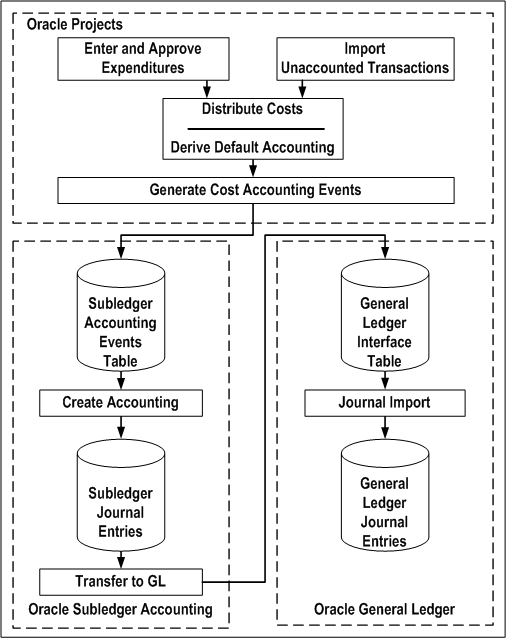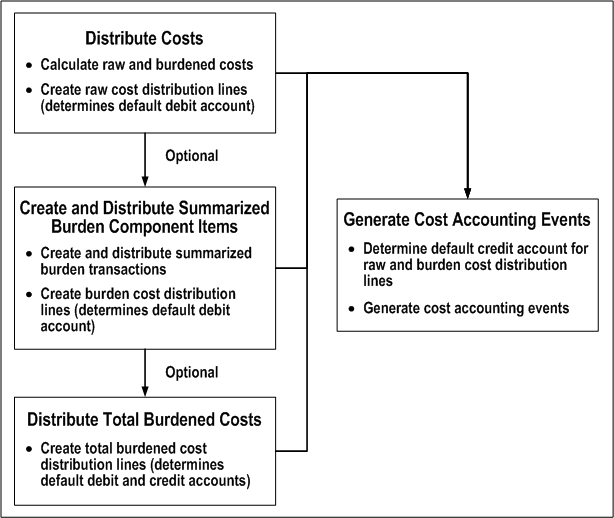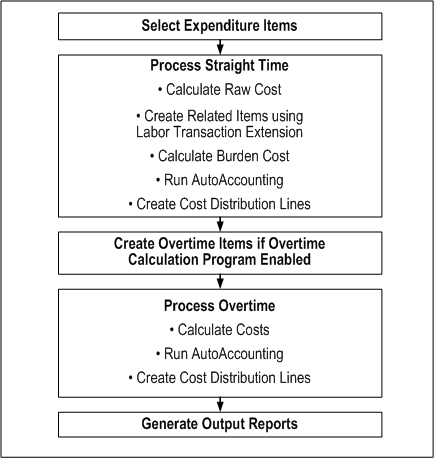Overview of Project Costing
This chapter gives you an overview of project costing in Oracle Projects.
This chapter covers the following topics:
Overview of Costing
Costing is the processing of expenditures to calculate their cost to each project and determine the GL accounts to which the costs will be posted. Costing is performed for the following types of expenditures:
-
Pre-approved expenditures. See: Overview of Expenditures.
-
Labor
-
Usages
-
Miscellaneous Transactions
-
-
Burden transactions. See: Overview of Burdening.
-
Expenditures submitted from Oracle Internet Expenses. See: Integrating Expense Reports with Oracle Payables and Oracle Internet Expenses.
-
Supplier Costs. See: Integrating with Oracle Purchasing and Oracle Payables.
-
Imported expenditures. See: Transaction Import, Oracle Projects APIs, Client Extensions, and Open Interfaces Reference.
-
Adjusted expenditures in Oracle Projects that need re-costing. See: Adjusting Expenditures.
Related Topics
Costing in Oracle Projects
The following illustration shows how costing is performed and accounted in Oracle Projects.

As shown in the illustration, Costing in Oracle Projects, costing includes the following major steps:
-
Enter and approve expenditures through the Oracle Projects user interface, or import transactions (for example, through Transaction Import).
Note: You can use Transaction Import to import unaccounted and accounted transactions. If you import unaccounted transaction, then you must run the costing processes for the transactions. If you import accounted transactions, then no additional processing is needed. For additional information, see: Transaction Sources, Oracle Projects Implementation Guide.
-
Distribute costs and derive default accounting. See: Costing Processes
-
Generate cost accounting events.
The generate cost accounting events process performs the following tasks:
-
Collects cost distribution lines in Oracle Projects and uses AutoAccounting to determine the default liability accounts for raw and burden costs
-
Generates cost accounting events for Oracle Subledger Accounting
-
-
Create accounting in Oracle Subledger Accounting and transfer the accounting entries to Oracle General Ledger. Depending on the parameter values you select, the create accounting process performs the following tasks:
-
Creates subledger accounting entries for unaccounted accounting events.
Note: If you define your own detailed accounting rules in Oracle Subledger Accounting, then Oracle Subledger Accounting overwrites default accounts, or individual segments of accounts, that Oracle Projects derives using AutoAccounting.
-
Transfers accounting entries to the Oracle General Ledger interface tables.
-
Initiates the journal import process in Oracle General Ledger. The journal import process uses the summary interface information stored in the Oracle General Ledger interface tables and automatically creates journal entries for posting in Oracle General Ledger.
-
Initiates posting of journal entries in Oracle General Ledger.
Note: You can optionally run the Subledger Period Close Exceptions Report to view information about unprocessed accounting events, accounting events in error, and transactions that are successfully accounted in final mode in Oracle Subledger Accounting, but not posted in Oracle General Ledger. This report provides you with the ability to separately tie back and determine whether accounting entries are posted in Oracle General Ledger.
-
Related Topics
Distribution Processes, Oracle Projects Fundamentals
Generate Cost Accounting Events, Oracle Projects Fundamentals
Create Accounting, Oracle Projects Fundamentals
Costing Processes
The following illustration shows the flow of costing processes in Oracle Projects.

As shown in the illustration Costing Processes, create and distribution processes perform the following tasks:
-
Calculate raw cost (quantity x rate) in transaction currency
-
Calculate burden and burdened cost
Burden costs are legitimate costs of doing business that support raw costs and cannot be directly attributed to work performed. Examples of burden costs are fringe benefits, office space, and general and administrative costs. Burdened cost is the total cost of an expenditure item, including raw cost and burden costs. For information about burden and burdened costs, see: Overview of Burdening.
-
Create and distribute raw cost distribution lines
-
Convert all transaction currency amounts to functional currency and project cost currency amounts
-
Create and distribute burden and burdened cost distribution lines
-
Determine default accounting using AutoAccounting (debit account for raw cost and burden costs, debit and credit accounts for total burdened costs)
Note: If you are not performing burdening, you can skip the processes that create and distribute burden and burdened cost.
-
Generate cost accounting events. See: Costing in Oracle Projects.
Calculating Costs
This section briefly describes how Oracle Projects calculates costs for expenditures. For more detailed information about the costing process, refer to the labor costing example in this chapter. See: Distributing Labor Costs.
Each transaction has two cost amounts when processed, raw and burdened. Oracle Projects calculates these amounts for each detail transaction when you distribute costs using any of the following processes:
-
Distribute Labor Costs
-
Distribute Usage and Miscellaneous Costs
-
Distribute Supplier Cost Adjustments
-
Distribute Expense Report Adjustments
The raw cost is the actual cost of the work performed, and the burden cost is the indirect cost of work performed. The burden costs are created to apply overhead costs to projects to provide an accurate total cost figure. The burdened cost is the total cost of the expenditure, or the sum of raw cost and burden cost. Oracle Projects calculates the burden cost using the raw cost and a burden multiplier.
Calculating Labor Cost
Oracle Projects calculates cost for labor transactions using quantity and rates as follows:
-
Raw cost is the result of multiplying hours by a rate.
-
Burden cost is the result of multiplying raw cost by a burden multiplier.
-
Burdened cost is the sum of raw cost and burden cost.
Note: You can define a unique labor costing algorithm using the Labor Costing Extensions. See: Labor Costing Extensions, Oracle Projects APIs, Client Extensions, and Open Interfaces Reference.
Related Topics
Calculating Cost for Usages and Miscellaneous Transactions
Oracle Projects calculates the cost for usages and miscellaneous transactions as follows:
-
Raw cost is equal to quantity (if quantity is in currency, for example, a currency amount), or alternatively, raw cost is the result of multiplying quantity by a rate (if quantity is not in currency). You can define cost rates for usage and miscellaneous costs as follows:
-
cost rates by expenditure type
-
cost rates by non-labor resource and owning organization for usages (optional); overrides expenditure type cost rate
-
-
Burden cost is the result of multiplying raw cost by a burden multiplier.
-
Burdened cost is the sum of raw cost and burden cost.
Related Topics
Using Rates for Costing, Oracle Projects Fundamentals
Calculating Burden Cost and Total Burdened Cost
Oracle Projects calculates burden cost by multiplying raw cost by a burden multiplier. This calculation is represented in the following formula:
Burden Cost = Raw Cost x Burden Multiplier
Oracle Projects calculates total burdened cost by adding burden cost to the raw cost amount. This calculation is represented in the following formula:
Total Burdened Cost = Raw Cost + Burden Cost
You use the burden multiplier to derive the total amount of the burden cost.
Related Topics
Determining Supplier Costs
Oracle Projects determines costs for receipt accruals from Oracle Purchasing and supplier costs from Oracle Payables using the following logic:
-
For supplier costs interfaced from Oracle Payables, raw cost for each expenditure item is equal to the supplier invoice distribution line amount (accrual basis accounting) or the payment distribution amount (cash basis accounting) in Oracle Payables.
For receipt accrual costs interfaced from Oracle Purchasing, raw cost is equal to the receipt transaction amount in Oracle Purchasing.
For contingent worker timecards with Oracle Purchasing integration, when you run the process PRC: Distribute Labor Costs, Oracle Projects uses rates from the related purchase order to calculate the costs.
-
Burden cost is the result of multiplying raw cost by a burden multiplier.
-
Burdened cost is the sum of raw cost and burden cost.
Oracle Projects determines costs for supplier invoice transactions during the following processes:
-
PRC: Interface Supplier Costs
-
PRC: Distribute Supplier Cost Adjustments
-
PRC: Distribute Supplier Costs Adjustments for a Range of Projects
-
PRC: Distribute Labor Costs (for contingent worker timecards)
Related Topics
Integrating with Oracle Purchasing and Oracle Payables
Determining Expense Report Costs
Oracle Projects determines costs for expense reports that you interface from Oracle Payables to Oracle Projects using the following logic:
-
Raw cost for each expenditure item is equal to the expense report invoice distribution line amount (accrual basis accounting) or the payment distribution amount (cash basis accounting) in Oracle Payables.
-
Burden cost is the result of multiplying raw cost by a burden multiplier.
-
Burdened cost is the sum of raw cost and burden cost.
-
Receipt amount is the expenditure amount in the receipt currency.
Note: When a receipt in Oracle Payables is split across multiple expenditure items, Oracle Projects does not divide the receipt amount among the expenditure items. As a result, each expenditure item is associated with the full receipt amount.
Oracle Projects determines costs for expense reports during the following processes:
-
PRC: Interface Expense Reports from Payables
-
PRC: Distribute Expense Report Adjustments
Related Topics
Integrating Expense Reports from Oracle Payables and Oracle Internet Expenses.
Distributing Labor Costs
This section illustrates the costing process using Labor Costing as an example.
Oracle Projects allows you to enter detail labor transactions charged to your projects so that you can monitor labor work performed. Oracle Projects costs the items to compute the labor costs for your project, and determines the GL accounts to charge.
The following illustration shows the steps in the PRC: Distribute Labor Costs process:
Steps in the PRC: Distribute Labor Costs Process

The PRC: Distribute Labor Costs process handles labor items in the following order:
-
Selects eligible expenditure items, based on the parameters you entered for project, employee, and week ending date.
-
Costs the straight time items.
-
Calls the Overtime Calculation program, if it is enabled.
-
Costs overtime items, including overtime items created by the Overtime Calculation program.
Note: If your transactions are not costing properly, you can view rejection reasons in the Expenditure Items window. From the Folder menu, choose the Show Field option to display all cost distribution rejections.
Related Topics
Distribute Labor Costs Process, Oracle Projects Fundamenatals
Rate Schedule Definition, Oracle Projects Implementation Guide
Using Rates for Costing, Oracle Projects Fundamentals
Selecting Expenditure Items
The Distribute Labor Costs program first selects all expenditure items that are eligible for costing. To be eligible for costing, an expenditure item must meet the following criteria:
-
Classified with an expenditure type having the Straight Time or Overtime expenditure type class
-
Included in the specified project for straight time items (if you specify a project)
-
For the specified employee (if you specify an employee)
-
In a week ending on or before the end date (if you specify a week ending date)
-
In a released pre-approved timecard batch
-
Not already cost distributed (new items or items marked for adjustment)
Expenditure items selected are processed in sets according to the Expenditures Per Set profile option For more information, see: Profile Options in Oracle Projects, Oracle Projects Implementation Guide.
Processing Straight Time
Distribute Labor Costs performs three steps to process straight time:
-
Calculate costs
-
Run AutoAccounting
-
Create cost distribution lines
Important: Throughout this document, the term resource applies equally to employees and non-employees (contingent workers) when used in discussions about features that support capturing, processing, and reporting time and costs that pertain to people. Similarly, the term employee is also meant to apply to contingent workers. For more information about contingent workers, see: Support for Contingent Workers, Oracle Projects Fundamentals.
Calculating Costs
Oracle Projects calculates straight time cost (raw cost) for expenditure items by multiplying hours worked by an employee's labor cost rate. This calculation is represented in the following formula:
Straight Time Cost = (Hours Worked x Employee's Labor Cost Rate)
Distribute Labor Costs uses the labor cost rate that is in effect for an employee as of the week ending date for each selected expenditure item. This amount can be overridden by the Labor Costing Extension to handle unique labor costing rules.
Note: If a timecard for a contingent worker is associated with a purchase order, then the labor cost rates for the contingent worker are defined on the purchase order.
If an employee's labor cost is burdened, Oracle Projects calculates the burdened cost by multiplying straight time cost times a factor equal to one plus the burden multiplier. This calculation is represented in the following formula:
Burdened Cost = (Straight Time Cost x (1 + Burden Multiplier))
To determine if a labor cost is burdened, Oracle Projects checks the project type of the project to which an expenditure item is charged. The burden multiplier is determined from the burden schedule (or burden schedule override) assigned to the project or task. In addition, Oracle Projects compares the expenditure item date to the effective dates of the burden schedule to determine the burden multiplier to use.
Running AutoAccounting
After the process calculates cost for each selected expenditure item, it runs AutoAccounting to determine default account codes for each cost distribution line that it will create.
If an organization distribution override exists, the destination organization of the override supersedes the actual expenditure organization of affected items.
When you run the cost distribution programs for labor, expense report adjustments, or usages and miscellaneous transactions, Oracle Projects redirects the Expenditure Organization to the Override To Organization if you have specified any of the following organization distribution overrides for the organization:
-
Incurred by Employee and Expenditure Category
-
Incurred by Employee
-
Expenditure Organization and Expenditure Category
-
Expenditure Category
If you do not specify any of these overrides, Oracle Projects uses the Incurred by Organization or the Expenditure Organization.
Creating Cost Distribution Lines
After the Distribute Labor Costs process runs AutoAccounting, it creates cost distribution lines. Each item originally has one distribution line for raw cost. If an item is re-costed and the cost rate or account coding changes, Distribute Labor Costs creates a reversing cost distribution line and a new line for the updated cost or account coding.
Related Topics
Labor Costing Extensions, Oracle Projects APIs, Client Extensions, and Open Interfaces Reference
Accounting Transactions for Cost, Oracle Projects Fundamentals
Creating Overtime
You can use Oracle Projects to track the cost of overtime and other premium compensation, allowing you to determine the true cost of labor.
When an employee works overtime, in addition to charging the total hours an employee worked to the project(s) on which the employee worked, you calculate and charge the overtime hours and costs. Therefore, the employee's pay includes two components:
-
Straight time cost
-
Overtime or premium cost
Note: If a timecard for a contingent worker is associated with a purchase order, then the overtime price differential multipliers for the contingent worker can be defined on the purchase order.
Tracking Overtime
When you enter timecards in Oracle Projects, you charge the total hours an employee worked to the project(s) on which the employee worked.
You can track overtime premium costs in Oracle Projects in three primary ways:
-
Charge to an indirect project.
-
Charge to a project on which overtime was worked.
-
Charge to a project on which overtime was worked and track premium amounts separately.
Oracle Projects creates overtime when you enter it manually or when the Overtime Calculation program creates it automatically. If you enter overtime manually, the Distribute Labor Costs program does not create overtime, and instead proceeds directly to calculating overtime cost. If you enable the Overtime Calculation program, then the Distribute Labor Costs process calls the program to create overtime automatically.
Related Topics
Distribute Labor Costs, Oracle Projects Fundamentals
Implementing Overtime Processing, Oracle Projects Implementation Guide
Overtime Calculation Extension, Oracle Projects APIs, Client Extensions, and Open Interfaces Reference
Processing Overtime
Distribute Labor Costs performs three steps to process overtime:
-
Calculate costs
-
Run AutoAccounting
-
Create cost distribution lines
Calculating Overtime Cost
Oracle Projects calculates premium overtime cost (raw cost) for overtime items by multiplying an employee's labor cost rate by a labor cost multiplier that corresponds to the type of overtime worked. This calculation is represented in the following formula:
Premium Overtime Cost = (Hours Worked x Employee's Labor Cost Rate) x Labor Cost Multiplier
Overtime may or may not be burdened, depending on your burdening setup.
Running AutoAccounting
After the process calculates cost for each selected expenditure item, it runs AutoAccounting to determine default account codes for each cost distribution line that the process creates.
If an organization distribution override exists, then the destination organization of the override supersedes the actual expenditure organization of affected items.
Creating Cost Distribution Lines
After the process runs AutoAccounting, it creates cost distribution lines. Each item originally has one distribution line for raw cost. If an item is re-costed and the cost rate or account coding changes, Distribute Labor Cost creates a reversing cost distribution line and a new line for the updated cost or account coding.
Generating Labor Output Reports
The Distribute Labor Costs process generates output reports that list detail items that were processed and exception items.
Related Topics
Distribute Labor Costs Process, Oracle Projects Fundamentals
Calculating and Reporting Utilization
The utilization functionality of Oracle Project Costing and Oracle Project Resource Management enables you to generate and report on your resource's actual and scheduled utilization. Using Oracle Project Costing, you can report on your resource's actual resource utilization based on actual hours from timecards. For more information, see: Utilization, Oracle Projects Fundamentals.